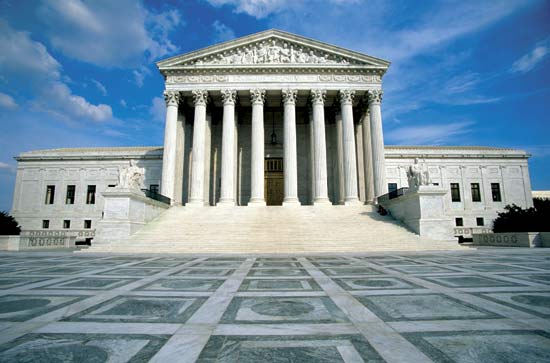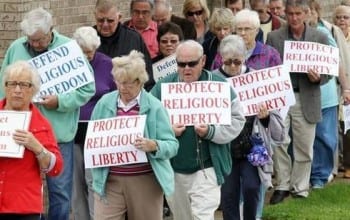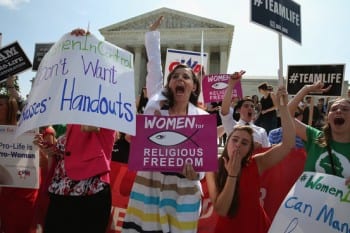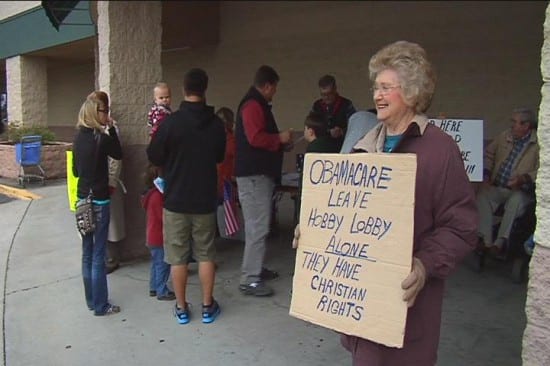[O]n the final day of its term, the Supreme Court’s radical right-wing majority has dealt crippling blows to two causes close to the heart of progressives.
It elevated the rights of corporations owned by fundamentalist Christians above the rights of their female employees, saying those businesses don’t have to pay for any contraception in health plans. And it ruled that non-union employees who work at jobs where unions negotiate pay and benefits—for all workers—do not have to pay any union fees akin to union dues.
In both instances, the Court’s right-wing block delivered what have long been goals of two distinct factions of the Republican Party.
For religious conservatives, it said that protecting religious freedom was a higher priority than ensuring women received all reproductive health options. It also said that corporations have First Amendment religious rights protected by the First Amendment, a win for Christian fundamentalists and religious business owners. And for the GOP’s union-busting business wing, epitomized by the Koch brothers’ libertarian political network, it said that union fees could not be collected for electioneering purposes—even if non-union employees at the same work site benefitted from union bargaining.
Rolling Back Women’s Reproductive Rights
The blow against women came in an Obamacare case, where the five conservative justices held that private employers do not have to include contraceptive coverage in employee health plans if the business owners’ religion is opposed to abortion-related services. The ruling, Burdell v. Hobby Lobby , which dissenting Justice Ruth Bader Ginsburg called “extreme” in her comments from the bench and dissent, also affirmed that corporations—not just individuals—possess religious rights and freedoms protected by the First Amendment.
“We must decide whether the challenged HHS [U.S. Department of Health and Human Services] regulations substantially burden the exercise of religion, and we hold that they do,” wrote Justice Samual Alito for the majority. “Government action that imposes a substantial burden on religious exercise must serve a compelling government interest, and we assume that the HHS regulations satisfy this requirement. But in order for the HHS mandate to be sustained, it must also constitute the least restrictive means of serving that interest, and the mandate plainly fails that test.”
In other words, Alito said that the part of Affordable Care Act, better known as Obamacare, that requires private employers to provide contraception was too strict. The law exempted religious non-profit organizations—such as Catholic hospitals—that believe birth control is against their beliefs. But that distinction, which treated non-profits differently than private corporations, did not suffice for conservatives who upped the rhetorical ante and argued that anything requiring birth control violated their religious liberty.
Justice Ruth Bader Ginsburg, writing a lengthy minority opinion dissent joined by all the Court’s women justices and Justice Stephen Breyer, was flabbergasted by the right-wingers’ reasoning and historic expansion of corporate constitutional rights under the guise of religious freedom.
“In a decision of startling breadth, the Court holds that commercial enterprises, including corporations, along with partnerships and sole proprietorships, can opt out of any law (saving only tax laws) they judge incompatible with their sincerely held religious beliefs,” her dissent began. “The exemption sought by [Christian businesses] Hobby Lobby and Conestoga would override significant interests of the corporations’ employees and covered dependents. It would deny legions of women who do not hold their employers’ beliefs access to contraceptive coverage that the ACA would otherwise secure.”
Reactions to the decision were immediate. The liberal People for the American Way said, in an e-mail blast, “The Supreme Court just ruled 5-4 that CORPORATIONS have a ‘religious’ right to discriminate against their employees.” The right-wing Independent Women’s Forum said, “This ruling is a victory for anyone who believes in limited government and freedom of conscience rights or religious liberty.”
“Today’s decision not only deprives women of comprehensive healthcare, but it sets a terrifying standard in affirming the “personhood” of corporations. In siding with Hobby Lobby, the Supreme Court yet again affirms the personhood of corporations, giving closely-held (i.e. limited number of stockholders) corporations so-called religious liberty and taking religious freedom away from their employees at the expense of women’s health,” said Feminist Majority Foundation President Eleanor Smeal. “This sets a dangerous precedent for the future of religious liberty and women’s rights.”
The ruling comes from several anti-Obamacarre lawsuits filed by conservatives that were consolidated into one case. Two prominent lawsuits brought against Obamacare’s birth control mandate had been dismissed by lower federal circuit courts, but that didn’t stopped Hobby Lobby, an Oklahoma-based crafts supply chain, from filing their own challenge. When another lower federal court sided with Hobby Lobby, that conflict among different federal circuits pushed the case to the Supreme Court.
Hobby Lobby is a large chain of craft stores owned by conservative evangelical Christians. It sued in federal court , claiming they should have the right to deny coverage for emergency contraception to over 13,000 employees in 40 states. Its owners, the Green family, claim that Obamacare’s requirement to provide employer-based coverage for contraceptive service violates freedom of religion and speech.
The lawyers carrying the Greens case went further than just raising religious objections. They also cited some of the factually mistaken arguments seen in other anti-abortion fights, referring to emergency contraception as an “abortion-causing drug.” Morning-after pills do not end a pregnancy, but act as daily birth control pills do to prevent fertilization from occurring.
President Obama defended the law’s birth control provision, saying “it is not fair ” for religious employers to deny access to contraceptive services to their non-religious employees. In response to Monday’s ruling, it is possible that the White House will seek to create an administrative rule that would cover the cost of contraception denied by these religious employers, lawyers following the case said.
But the issue here is larger than just religious objections to Obamacare. The precedent, as Justice Ginsburg noted, that a corporation can assert religious freedom rights under the First Amendment opens a Pandora’s box of possible resistance to other federal mandates.
UCLA Law School’s Adam Winkler, writing at Huffington Post, said that corporate religious rights under the First Amendment are now more powerful than individual rights of privacy, and asked which issue, after women’s access to contraception, would be targeted by the religious right?
“LGBT people may be next,” he wrote . “Remember a few months ago when Arizona almost adopted a controversial law that would have given business corporations a broad right to use religion to make claims for exemptions from the law? That proposed law was rightly seen as an attack on LGBT rights, as supporters insisted that business owners who object to same-sex marriage shouldn’t be forced to bake cakes, take pictures, or arrange the flowers at such ceremonies. After Hobby Lobby, now all business corporations have a right under federal law to claim religious-based exemptions to all sorts of laws.”
The ruling is the second time that the Court’s so-called conservatives have issued rulings seeking to undercut Obamacare. Its prior ruling that states do not have to expand their Medicaid programs, which offer health care to the poor, has left millions of low-income Americans without preventative health coverage—as opposed to visiting emergency rooms in crises.
The Court’s Sweeping Anti-Labor Ruling
The Court also vastly undercut the political power of public-sector unions on Monday, with the same block of justices limiting which government employees must pay union dues, cutting into unions’ operating funds for lobbying and other political activities. The case, Harris v. Quinn , concerned the constitutionality of “agency fees,” which are charged by these unions to all workers in a unionized setting, even non-union members. The rationale is those workers are benefitting from gains won in union-led contract talks.
Here, too, the right-wing majority cited a First Amendment rationale to undermine union organizing.
“This case presents the question whether the First Amendment permits a State to compel personal care providers to subsidize speech on matters of public concern by a union that they do not wish to join or support. We hold that it does not,” Alito, writing for the Court’s five-member, held. “If we accepted Illinois’ argument, we would approve an unprecedented violation of the bedrock principle that, except perhaps in the rarest of circumstances, no person in this country may be compelled to subsidize speech by a third party that he or she does not wish to support.”
Justice Elena Kagan, writing the dissent, called the majority opinion blatantly political, because the Court had previously upheld the union dues requirement when the funds were used for employment contracts—not lobbying or political advocacy. “The Court upheld the requirement so long as the union was using the money for “collective bargaining, contract administration, and grievance adjustment,” rather than for political or ideological activities.”
For years, Republicans in many states have tried to undermine the financing of unions’ ability to lobby and electioneer by seeking other avenues to undercut union dues. States like California have seen numerous so-called “paycheck protection measures” sponsored by the business sector appear as ballot initiatives, though they are almost always voted down by the state’s electorate. The ruling in Harris v. Quinn may achieve what these ballot measures failed to do: shrink union dues because there’s always a portion of workers who don’t want to pay these union fees, even if reaping the benefits of union advocacy.
The case began with home health care workers in Illinois paid under the state’s Medicaid program, which covers health care for the poor. In 2003, then Democratic Governor Rod Blagojevich issued an executive order allowing the Service Employees International Union to exclusively representing the state’s home health workers. In 2009, his successor, Democratic Governor Pat Quinn issued another executive order classifying home care providers as state workers, making them eligible for union representation. A year later, a group of home health workers, led by Pamela Harris, brought a class-action lawsuit claiming that the SEIU’s collective bargaining agreement that required non-union members to pay union fees violated their First Amendment rights.
It’s important to emphasize that this ruling also is anti-women. Not only are a majority of SEIU’s 2.1 million members women working in low-wage jobs—like home health care, but the political agenda of unions like SEIU for these workers was focused on many issues that deeply affect low-income families. These include raising the minimum wage, ensuring sick pay, and benefits like health care. The GOP’s libertarians have long seen government-paid unionized employees as one of the labor movement’s remaining bastions of strength.
SIEU officials reacted with defiance, issuing a statement saying their political efforts would not be silenced.
“No court case is going to stand in the way of home care workers coming together to have a strong voice for good jobs and quality home care,” said SEIU President Mary Kay Henry. “At a time when wages remain stagnant and income inequality is out of control, joining together in a union is the only proven way home care workers have of improving their lives and the lives of the people they care for.”
But labor officials have long feared the implications of this kind of ruling. That’s because it could make Democrats more reliant on Wall Street money for their campaigns than on their traditional allies in unions, which contribute both money and volunteer manpower.






